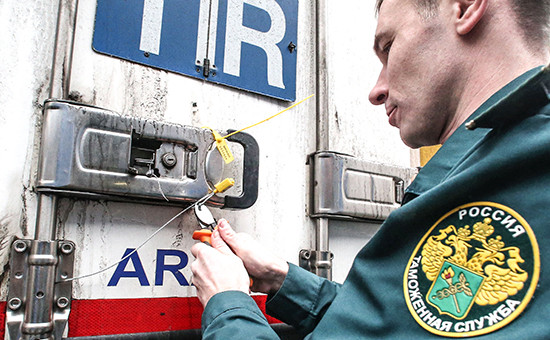
Photo: RIA Novosti
The Russian earned a law officially sanction the destruction of products which are imported illegally into the country. A spokesman for the Rosselkhoznadzor Yulia Melano told Tass that Belgorod hit by the destruction of 10 tons of cheese.
«destruction of the sanctions began production in Belgorod. According to specified data, the batch of products to be destroyed, is 10 tonnes, instead of 7 tons, as previously reported “, – said the chalk. According to the spokesperson, the cheese came from Ukraine, but its origin is not known. She said that first crush products using the rink, and then move in a specially dug pit.
The Assistant Head of Rosselkhoznadzor Alexey Alekseenko previously promised that sanctions will be destroyed products daily. “It will Kaliningrad, St. Petersburg, Bryansk, Smolensk, Pskov, south – Rostov region, on the other hand – the Orenburg region, Saratov, Altai. Wherever there is smuggling, “- he said. The official announced the elimination of “several hundred tons” of products on the first day of the law of August 6.
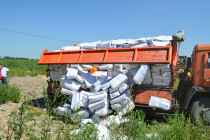
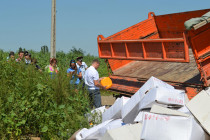
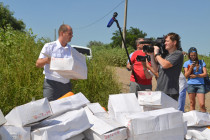
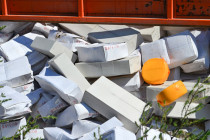 In Russia, August 6, began the destruction of sanctions products. One of the first was the batch of 10 tons of cheese, which was brought to Belgorod from Ukraine, but its origin could not be established experts. The production of crushed ice rink, and then moved in a specially dug pit. As previously stated in the Rosselkhoznadzor, disposal will be carried out on a daily basis in any manner prescribed by law.
In Russia, August 6, began the destruction of sanctions products. One of the first was the batch of 10 tons of cheese, which was brought to Belgorod from Ukraine, but its origin could not be established experts. The production of crushed ice rink, and then moved in a specially dug pit. As previously stated in the Rosselkhoznadzor, disposal will be carried out on a daily basis in any manner prescribed by law.In the near future, agency staff are going to destroy 73 tons of peaches and nectarines with Turkish certificates. They were detained at the Belarusian-Russian border. Experts doubted that travel through Greece and Moldova goods are actually made in Turkey.
Also on August 6 in Orenburg on a special testing ground will destroy 20 tons of Latvian cheese. In St. Petersburg for sanctions cheese chosen another method of disposal: it will not interfere with the pressure and with the ground and burned. There will destroy meat products, which came under the guise of “non-hazardous chemicals.”
Save 1.5 tons of tomatoes from the destruction of the sanctions succeeded van driver who transported through the Russian-Belarusian border vegetables without a phytosanitary certificate. Upon learning that the products to be destroyed, he stole a truck on the territory of Belarus
View 9 photos
The press service of the governor of the Kaliningrad region said that Acting Head of the region Nikolay Tsukanov instructed the regional Ministry of Housing conclude with customs and Rosselkhoznadzor contracts to receive goods sanctions on landfills for disposal.
Today, Rosselkhoznadzor detained at the Belarusian-Russian border, three cars of peaches and nectarines general weighing 73 tons, Interfax reported. The cargo arrived in Turkey, accompanied by phytosanitary certificates, but it turned out that the Turkish authorities did not issue such documents. “Suspicion staff Rosselkhoznadzor has caused a very peculiar to Turkish products in Russia route – transit through Greece, Moldova and Belarus”, – explained in the department. These fruits will also be destroyed.
August 6 in Orenburg will be destroyed 20 tons of Latvian cheese. “Cheese is destroyed mechanically at a special landfill, which has all the necessary permits and specialized equipment,” – said Melano.
In St. Petersburg, in turn, will burn about 20 tons of “sanctions cheese,” he said Tass source familiar with the situation. Subject to destruction and meat products, which arrived in the Big Port of St. Petersburg. This product was in 17 refrigerated containers under the guise of “benign chemistry».
On Thursday, the phytosanitary control station located in the village of Dolostsy Sebezh district of the Pskov region, was discovered by the machine on which Russia imported 1.5 tons of sanctions tomatoes. The driver of the van, knowing that the products must be destroyed, hijacked a truck on the territory of Belarus.
July 29, Russian President Vladimir Putin signed a decree on the destruction of products which came to Russia, despite the food embargo. The author of the initiative was made by Agriculture Minister Alexander Tkachev.
In August 2014, the Russian government in response to the tightening Western sanctions extend the ban on imports of some products from the EU, US, Australia, Canada and Norway. The sanctions list includes many kinds of products, including cattle meat, pork, poultry, meat, salted, dried or smoked fish and crustaceans, shellfish, milk, cheese, cottage cheese-based vegetable oils, sausages, vegetables, root crops , fruits and nuts.
No comments:
Post a Comment